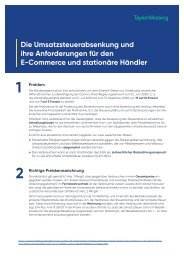Taylor Wessing - Key legal issues for games businesses
You also want an ePaper? Increase the reach of your titles
YUMPU automatically turns print PDFs into web optimized ePapers that Google loves.
E-Commerce – be<strong>for</strong>e the purchase<br />
The European market is subject to “distance selling” laws that protect<br />
players in relation to purchases online. Prior and after any purchase of<br />
<strong>games</strong>, or in-game items or virtual currency, online-game <strong>businesses</strong> have<br />
to comply with numerous requirements, which include:<br />
> The communication of clear terms and conditions at the time and<br />
also by e-mail (or at least a “durable medium”) upon order;<br />
> Fulfilment requirements in terms of payment; and<br />
> A right of refund <strong>for</strong> some products and services (which may apply<br />
to gaming items depending on the circumstances).<br />
Un<strong>for</strong>tunately, these requirements vary to a degree across the Member<br />
States. Further, each European Union Member State was required to give<br />
effect to the Directive on Consumer Rights (Directive 2011/83/EU) by<br />
13 June 2014. Each country is doing so under its own legislation. This<br />
new Directive requires, inter alia, online <strong>games</strong> <strong>businesses</strong> to ensure the<br />
player, when placing an order, explicitly confirms that the order implies an<br />
obligation to pay. If placing an order entails activating a button or a similar<br />
function, the button or similar function must be labelled in an easily legible<br />
manner only with the words ‘order with an obligation to pay’ or a corresponding<br />
unambiguous <strong>for</strong>mulation in the local language.<br />
There are also new regulations regarding digital content which will have an<br />
impact on <strong>games</strong> <strong>businesses</strong>, such as the requirement to obtain express<br />
consent and acknowledgment from players that the 14 day cooling off<br />
period will not apply after download.<br />
The current draft <strong>for</strong> a European Directive on Digital Content is likely to introduce<br />
the concept of “payment by data”, establish significant statutory<br />
warranties and retrieval of user content and user data upon termination.<br />
As the scope of this directive is broad, it will affect all online and mobile<br />
<strong>games</strong> providers selling to European customers. It is currently expected<br />
that the EU will adopt the Directive by the end of 2018.<br />
If <strong>games</strong> <strong>businesses</strong> fail to comply with the legislation which implements<br />
the Directive on Consumer Rights, it is likely that their players will not be<br />
<strong>legal</strong>ly bound under the relevant end user terms which include, of course,<br />
the obligation to pay (e.g. the cost of the game, virtual items and/or currency).<br />
It is there<strong>for</strong>e important that <strong>games</strong> <strong>businesses</strong> ensure the in<strong>for</strong>mation<br />
disclosure and other requirements of the implementing legislation<br />
are complied with.<br />
Online liability<br />
To the extent <strong>games</strong> <strong>businesses</strong> allow players to communicate with each<br />
other/post content or comments on the plat<strong>for</strong>m, such <strong>businesses</strong> run<br />
the risk of content liability. European laws do include certain defences<br />
around “hosters” and “ISPs” however the applicability of these is dependent<br />
on careful consideration in terms of operating model, particularly<br />
around moderation and notice and take-down procedures <strong>for</strong> so called<br />
host providers. According to recent case law of the European Court of<br />
Justice, internet access providers may be obliged to block content which<br />
infringes copyright under certain circumstances.<br />
Hosting of tournaments<br />
Games tournaments can be subject to various <strong>legal</strong> requirements. When<br />
hosting “offline” tournaments often held at events such as Gamescom or<br />
GDC, the host might also have to comply with additional requirements<br />
such as in respect of youth protection (e.g. not permitting underage gaming<br />
or supplying minors with alcohol), gambling law, advertisement law<br />
and entry requirements <strong>for</strong> players.<br />
When streaming a tournament, that streaming may under certain conditions<br />
qualify as a broadcast and be subject to a licensing requirement.<br />
The same may apply <strong>for</strong> gamers streaming gaming content on plat<strong>for</strong>ms<br />
like Twitch.<br />
Used <strong>games</strong> and key selling<br />
Recent case law in Europe has confirmed the rights of software licensees<br />
to share software which is “sold” and software providers, depending on<br />
their licensing model, cannot prevent this. The application of these laws to<br />
<strong>games</strong> software is uncertain but possible. Technical measures can be used<br />
and cloud based <strong>games</strong> are likely to not be caught. Of course the second<br />
hand market in disc based <strong>games</strong> is long established, however the laws<br />
present challenges <strong>for</strong> providers of downloaded <strong>games</strong> and terms need to<br />
be carefully crafted.<br />
Similar questions arise in connection with so-called key selling. German<br />
district courts ruled that the sale of isolated product keys by a third party<br />
infringed copyright and could be stopped accordingly.<br />
General additional <strong>issues</strong><br />
Recent case law in Europe has confirmed the rights of software licensees<br />
to share software which is “sold” and software providers, depending on<br />
their licensing model, cannot prevent this. The application of these laws to<br />
<strong>games</strong> software is uncertain but possible. Technical measures can be used<br />
and cloud based <strong>games</strong> are likely to not be caught. Of course the second<br />
hand market in disc based <strong>games</strong> is long established, however the laws<br />
present challenges <strong>for</strong> providers of downloaded <strong>games</strong> and terms need to<br />
be carefully crafted.<br />
Similar questions arise in connection with so-called key selling. German<br />
district courts ruled that the sale of isolated product keys by a third party<br />
infringed copyright and could be stopped accordingly.<br />
In-game currencies<br />
u Issues<br />
> Contractual rights to such currency, and what it can buy (meaning<br />
the terms need to be very clear on the value and rights relating to<br />
in-game currency);<br />
> Regulatory requirements around electronic money (which generally<br />
will only apply where a currency can be cashed out or used in other<br />
<strong>games</strong>/plat<strong>for</strong>ms or can otherwise be converted);<br />
> Regulatory <strong>issues</strong> relating to money remittance and payment<br />
systems, and also money laundering requirements in Europe; and<br />
> The increasing awareness in the media of the risk of minors running<br />
up significant bills through in-game purchases, leading to (i)
















